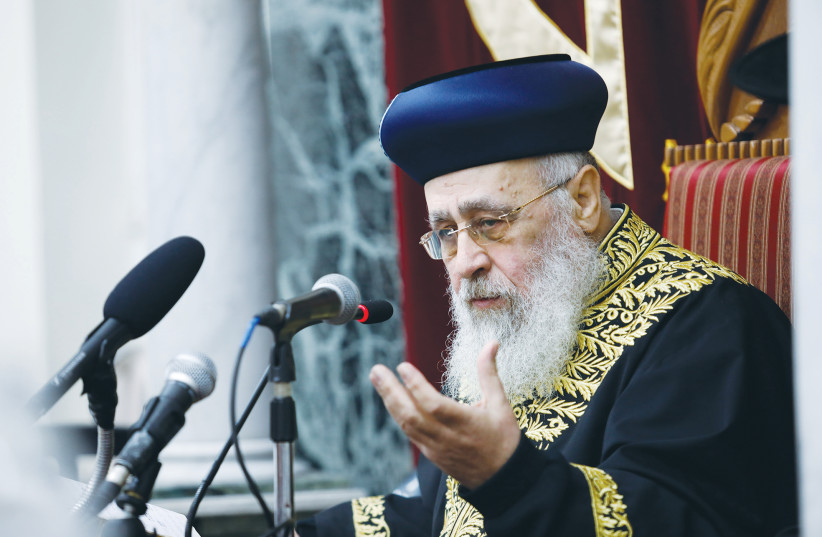Sephardi Chief Rabbi Yitzhak Yosef spoke out against Otzma Yehudit head MK Itamar Ben-Gvir during a class on Saturday night, expressing outrage that he publicly enters the Temple Mount despite many rabbis forbidding doing so.
The rabbi was speaking about bitul Torah, the requirement not to waste free time that could be used learning Torah, and about what topics should be discussed when taking a break from learning. He then brought up the case of someone who supports going up to the Temple Mount.
"'Here Rabbi So-and-So permitted entering the Temple Mount. What – is he not a rabbi?' Fool," said Yosef. "Is everyone called 'Gadol b'Torah' [a great rabbi]? Those who are Gedolei Torah are those who guide us. Who forbade entrance to the Temple Mount? All the Gedolei Torah."
The chief rabbi said that the rabbi who permits going up to the Temple Mount only "got near the ankles" of the rabbis who forbid it. "All the chief rabbis in their generations – they all forbade entrance to the Temple Mount," Yosef stressed, adding that those who support going to the Temple Mount are "stubborn."
"There's one called Ben-Gvir. He enters the Temple Mount boldly – what a 'chilul Hashem' [desecration of God's name], to go out against all the real 'Gedolei Yisrael' [great ones of Israel]," he said.

"Pay attention – think for a second. Fool – is this like your rabbi or all these other rabbis? This is all the [great rabbis]: dozens and dozens of rabbis," Yosef said. "When I entered the chief rabbinate, one of the things we did, together with my colleague [Ashkenazi Chief] Rabbi [Meir] Lau, [was that] I had all the rabbis in the Land of Israel, from all the sectors - also religious Zionists - sign that it is forbidden to enter the Temple Mount... They signed – over 100 rabbis."
A "very serious sin"
Yosef added that entering the Temple Mount is a "very serious sin," claiming that the rabbis who permit entering the site have led to visits by people who go up but don't undergo the required ritual immersion beforehand and who enter areas of the site that are forbidden to enter according to Jewish religious law due to ritual impurity.
"This MK comes, goes up to the Temple Mount, stirs things up, and also transgresses every order of [the great ones of Israel]."
Sephardi Chief Rabbi Yitzhak Yosef
"This MK comes, goes up to the Temple Mount, stirs things up, and also transgresses every order of [the great ones of Israel]," lamented the chief rabbi. "'Oy va'avoy!' (Woe are we!). You need to distance yourself from these things, to keep your distance from him and from all those who lead him. What kind of leaders are these?"
Ben-Gvir is one of a few MKs who supports entering the Temple Mount. On Jerusalem Day, he went up despite threats by Palestinian factions, tweeting afterwards "we will not submit to the threats of terrorist groups – we are the owners of Jerusalem!"
The Temple Mount debate
Whether or not entrance to the Temple Mount is permitted is heavily debated among rabbis, especially in the Religious Zionist sphere.
While many rabbis, such as Shlomo Goren, Haim Drukman, Dov Lior, Eliezer Melamed and Yisrael Rozen, among others, support entering the site while following the strictures of Jewish law, many others forbid doing so – and the official position of Israel's Chief Rabbinate is that entrance to the site is forbidden.
A sign placed by the Chief Rabbinate at the entrance used by Jews reads "According to Torah Law, entering the Temple Mount is strictly forbidden due to the holiness of the site."
According to halachah (Jewish law), those visiting the Temple Mount complex must immerse in a mikvah (ritual Jewish bath) before entering the site and those entering the site cannot wear leather shoes. Due to its sanctity, certain parts of the site are forbidden for entry according to Jewish law, even after immersing in a mikvah. The penalty for entering such areas is kareth – excision.
Jews who do visit the site are accompanied by both Israel Police and a representative of the Jordanian Islamic Waqf, who assure that they follow police regulations which ban worship and religious or Israeli national symbolism. Despite the regulations, limited Jewish worship has been allowed at the site in recent years.
Those visiting the site enter through the Mughrabi Gate in the Western Wall and take a circular route around the raised central platform where it is believed the two Jewish Temples once stood and where the Dome of the Rock stands today.
Entrance to the Temple Mount is permitted to Jews Sunday through Thursday from 7 to 11 a.m. and from 1:30 to 2:30 p.m. Those hours are subject to change due to the season, the security situation or Muslim holidays.
